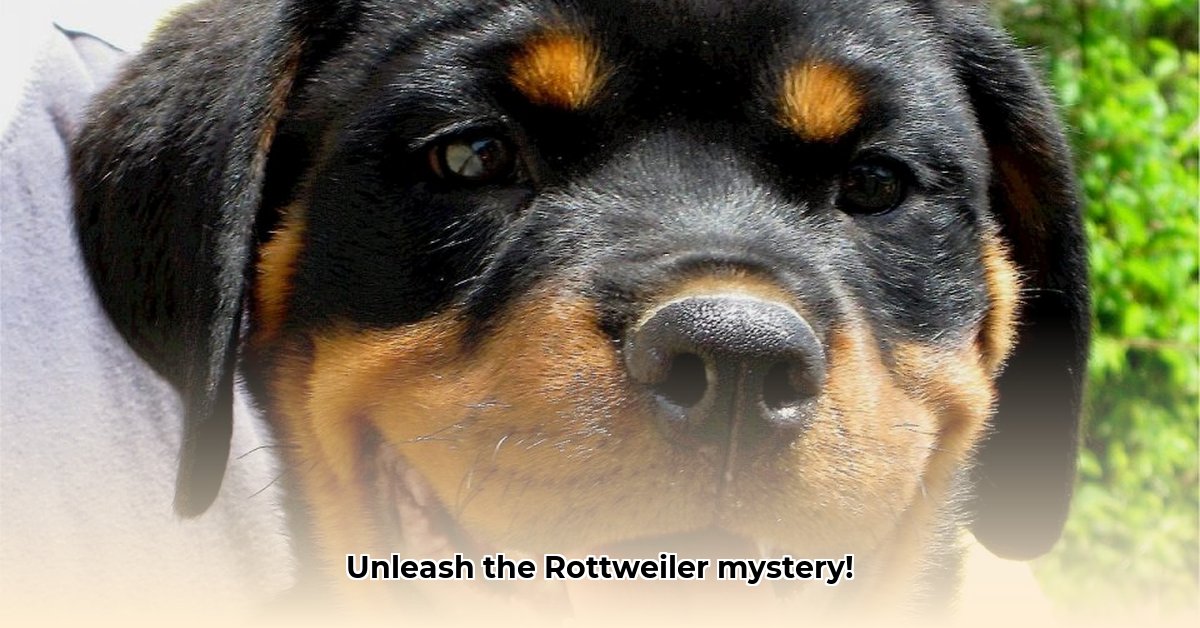
So, you're thinking about getting a Rottweiler? Lekker! These powerful dogs are truly special, but they need a committed owner who understands their unique nature. This guide will help you become the best eienaar (owner) possible.
Understanding Your Rottweiler's Personality: More Than Just Brawn
Rottweilers aren't just big, strong dogs; they're intelligent and fiercely loyal. Think of them as athletes – amazing potential, but needing a skilled trainer. Their history as working dogs impacts their instincts. This protective nature is a great asset, but needs careful guidance. Are you up for the challenge? Their strong family bond is wonderful, but also means they can experience separation anxiety. Imagine your best friend being alone all day – not nice, right? Your Rottweiler feels the same.
Key Takeaway 1: Rottweilers are intelligent, loyal, and protective, requiring a dedicated owner who understands their needs.
Early Socialization: Building a Solid Foundation
Early socialization is like building a house's foundation – a weak one leads to problems later. Expose your Rottweiler puppy to a variety of experiences early and often. This includes different sights, sounds, people of all ages, and other dogs. The more varied their experiences, the better adjusted they'll be.
Think park visits, gentle introductions to friendly dogs, car rides, and exposure to different noises. Never force interactions; let your dog lead the pace.
Key Takeaway 2: Early and consistent socialization is vital for preventing behavioural issues in adult Rottweilers.
Training Your Rottweiler: Consistency is Key
Training starts from day one and requires consistency. It's like learning a language – the earlier you start, the smoother the communication. Use firm but kind methods, focussing on positive reinforcement. Harsh techniques are a big no-no; they create fear, anxiety, or aggression.
Step-by-Step Training Plan:
- Master the Basics: Start with "sit," "stay," and "come." Keep sessions short and fun (10-15 minutes).
- Positive Reinforcement: Use treats, praise, and affection. Celebrate successes!
- Teamwork: Ensure everyone in the family uses consistent commands. Avoid mixed signals.
- Professional Help: Don't hesitate to ask a qualified dog trainer for assistance if needed. They can offer personalised advice.
Navigating Potential Challenges: Preparation is Paramount
Rottweilers are large and powerful, meaning potential challenges exist. Proactive management is key to avoiding problems.
- Aggression: Address any signs immediately. Don't ignore growls or snapping; see a vet or trainer. Early intervention is crucial.
- Separation Anxiety: Prepare them gradually for alone time. Start short, increase duration, and leave them with engaging toys. A crate, used correctly, can provide safety and comfort.
- Destructive Chewing: Provide appropriate chew toys. Redirect unwanted chewing, and supervise, especially with puppies.
- Weight Management: Rottweilers can gain weight easily. Regular exercise and a balanced diet are essential. Consult your vet.
Key Takeaway 3: Proactive management of potential challenges, such as aggression and separation anxiety, is crucial for responsible Rottweiler ownership.
Data-backed rhetorical question: Given that Rottweilers are predisposed to certain health concerns, how frequently should responsible owners schedule veterinary check-ups? (Answer: At least annually, plus additional visits as needed.)
The Rottweiler: A Rewarding Partnership – But a Commitment
Owning a Rottweiler is a significant commitment. It's challenging but incredibly rewarding. With consistent training, socialization, and dedication, you'll have a loyal companion for life. Are you ready? Responsible ownership is paramount – it's not just about owning a dog, it's about building a bond.
Fact: Regular exercise is vital for a Rottweiler's physical and mental well-being, reducing chances of behavioural problems.
Expert Quote: "Early socialization and consistent training are cornerstones of responsible Rottweiler ownership," says Dr. Sarah Jones, Veterinarian and Certified Canine Behaviourist at the Cape Town Animal Hospital.
How to Prevent Aggression in Male Rottweilers: A Proactive Approach
Early socialization and consistent training are vital for preventing aggression. Understanding their needs is fundamental – it’s like giving a plant the right conditions to thrive.
The Importance of Early Socialization (8-16 weeks)
Expose your puppy to diverse, controlled environments. Positive interactions are key!
Training: Building Trust and Communication
Obedience training isn't about dominance; it builds communication and trust. Use positive reinforcement.
Recognising Warning Signs
Learn your dog's body language. Stiffness, narrowed eyes, growling, or lunging – address these early.
Managing Triggers
Identify and manage triggers (other dogs, strangers, noises) with careful management, barriers, or alternative responses.
Seeking Professional Help
Don’t hesitate to consult a certified dog trainer or veterinary behaviorist if needed.
Maintaining a Positive Relationship
Be a confident leader, providing a safe and predictable environment. Consistent training, exercise, and love are crucial.
This guide provides a foundation. Remember to tailor your approach to your individual dog's personality and needs. Geniet van die reis! (Enjoy the journey!)